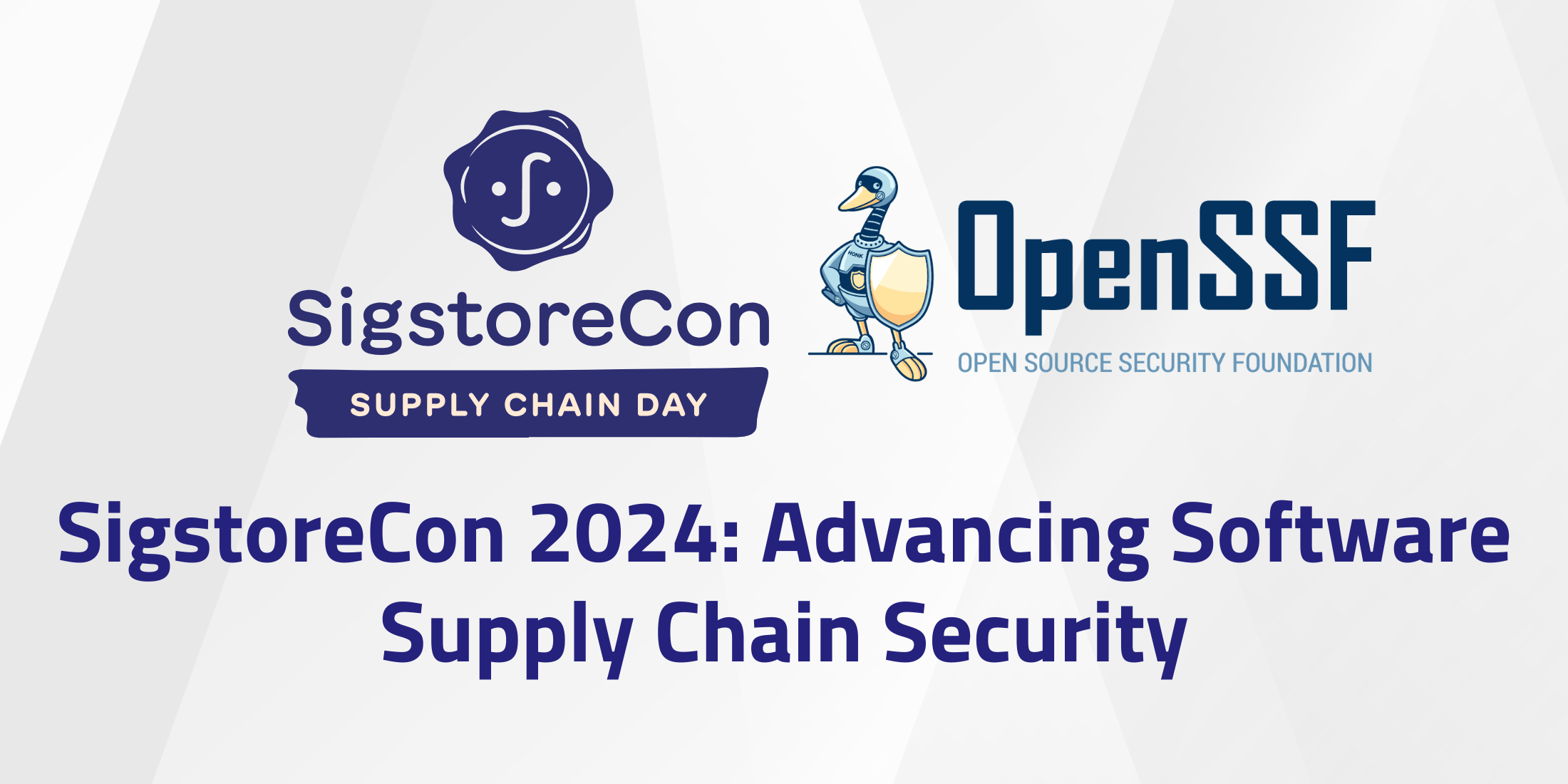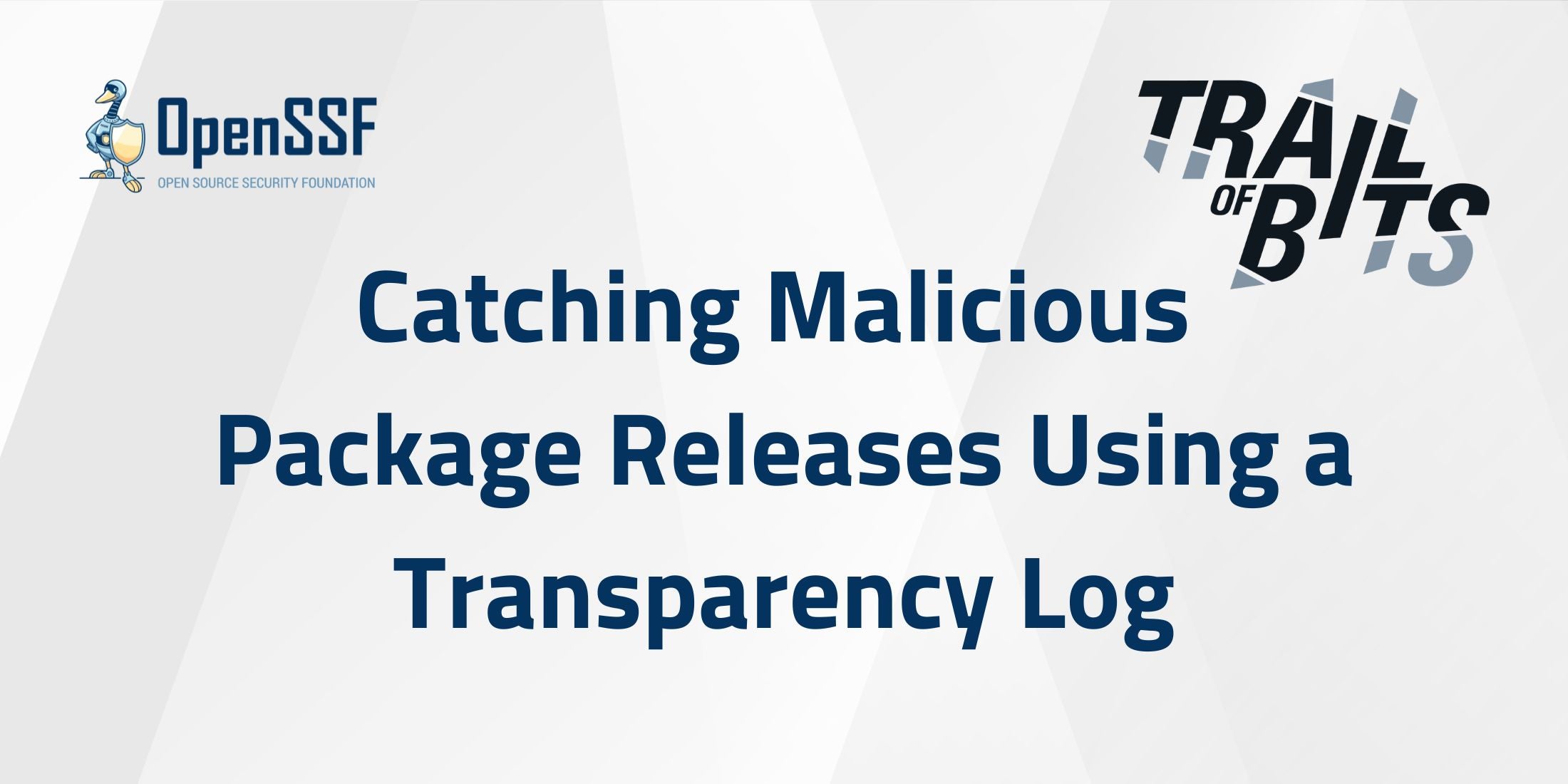


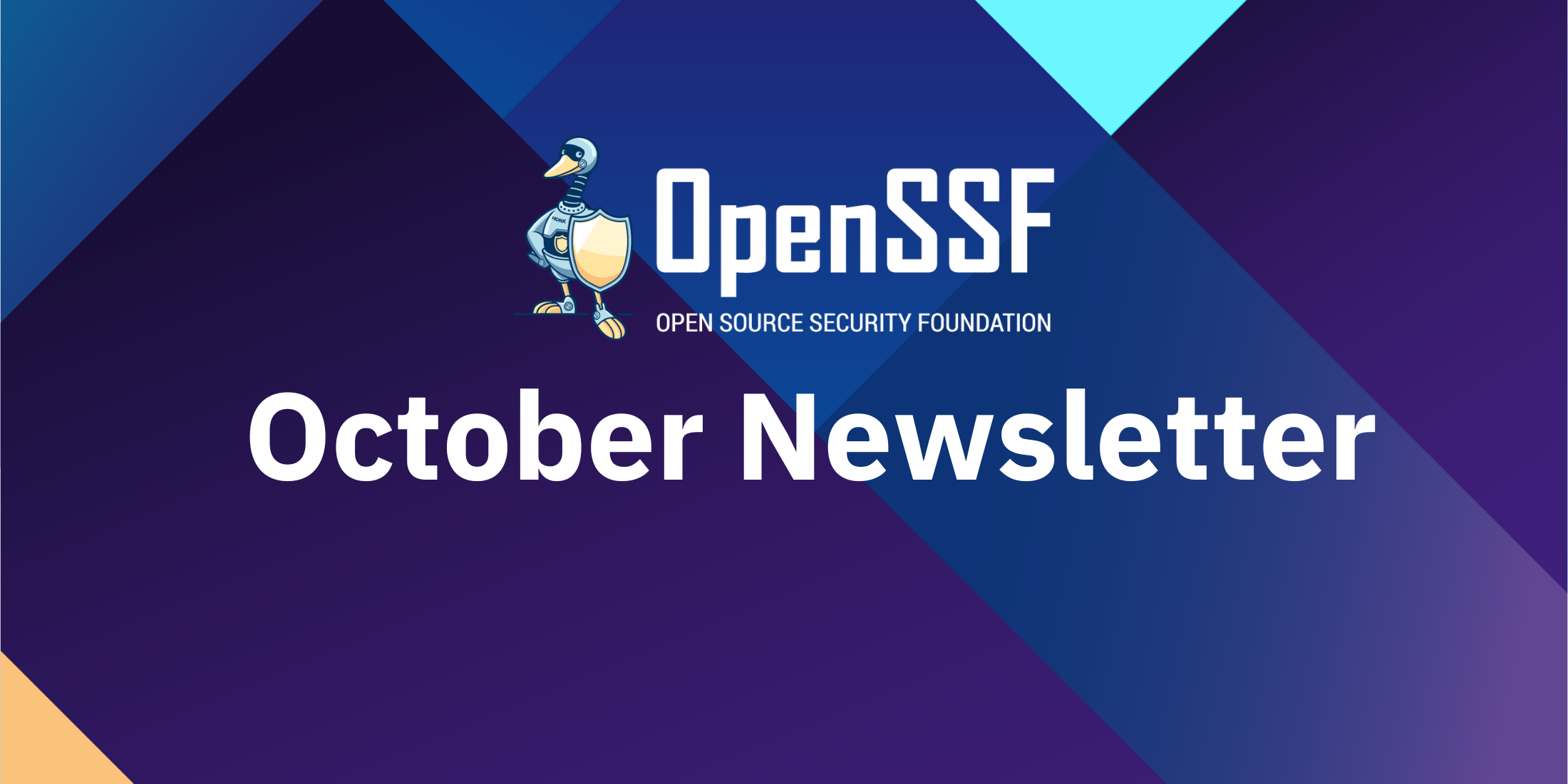
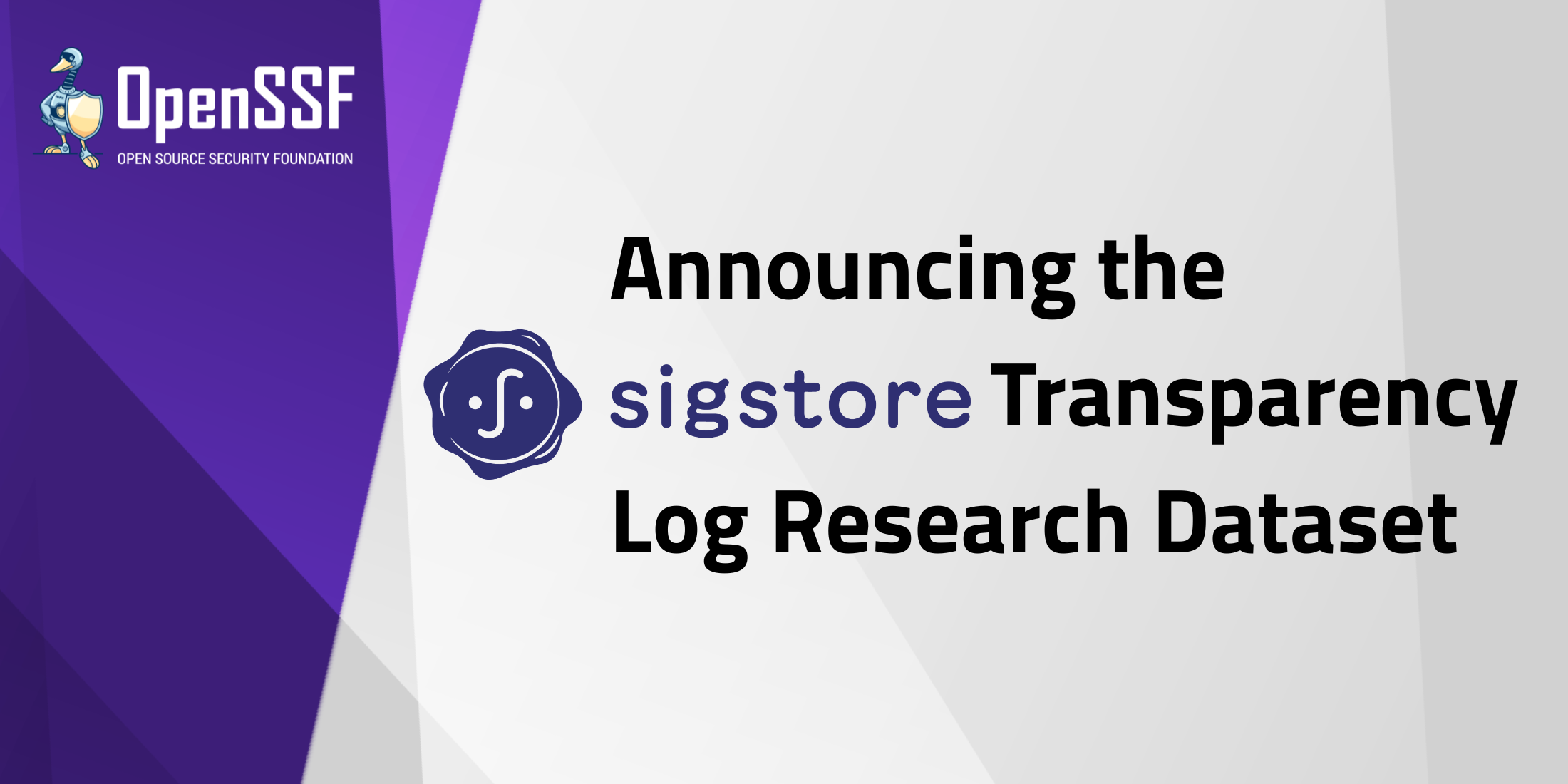
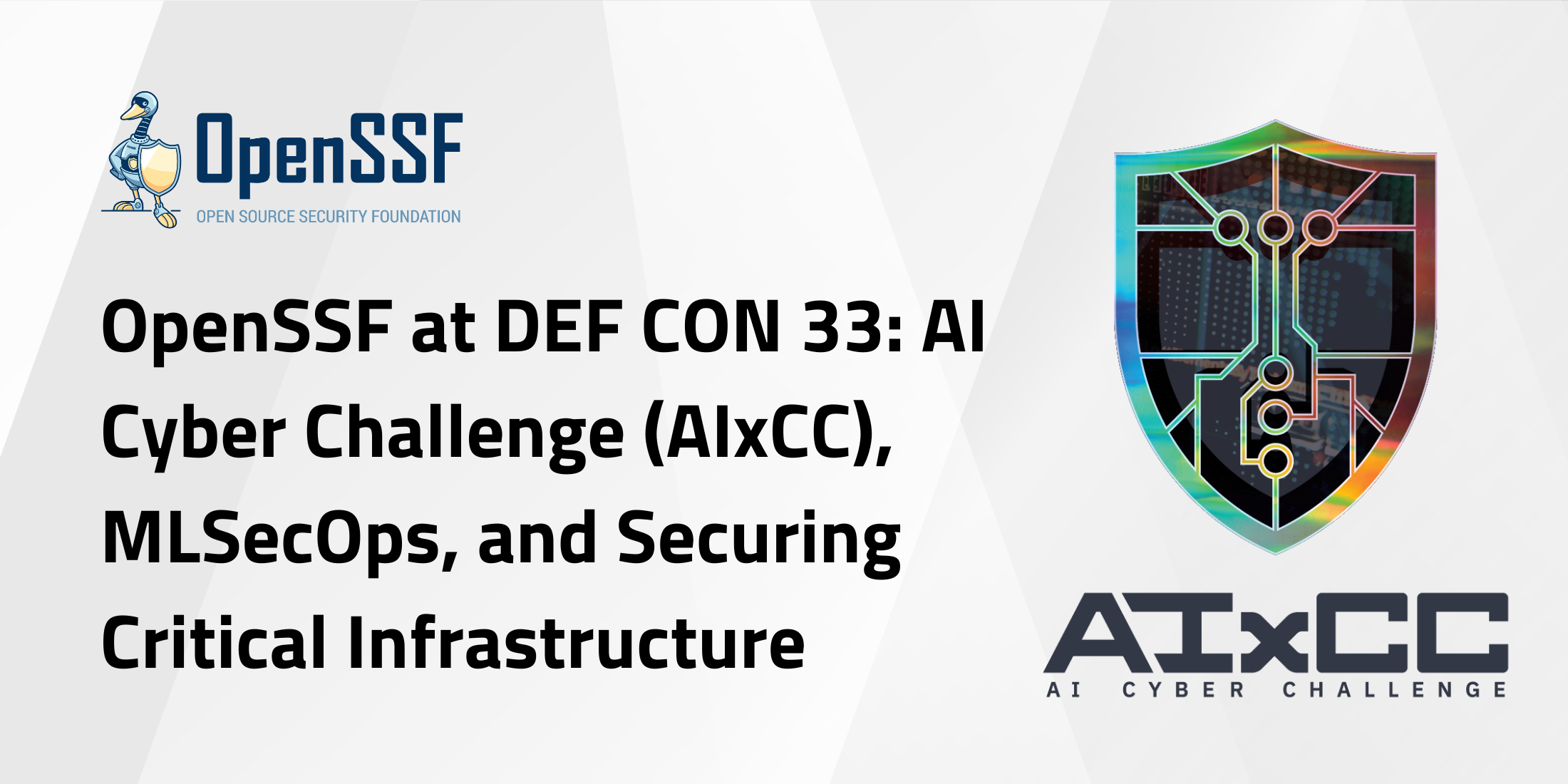
By Jeff Diecks
The OpenSSF team will be attending DEF CON 33, where the winners of the AI Cyber Challenge (AIxCC) will be announced. We will also host a panel discussion at the AIxCC village to introduce the concept of MLSecOps.
AIxCC, led by DARPA and ARPA-H, is a two-year competition focused on developing AI-enabled software to automatically identify and patch vulnerabilities in source code, particularly in open source software underpinning critical infrastructure.
OpenSSF is supporting AIxCC as a challenge advisor, guiding the competition to ensure its solutions benefit the open source community. We are actively working with DARPA and ARPA-H to open source the winning systems, infrastructure, and data from the competition, and are designing a program to facilitate their successful adoption and use by open source projects. At least four of the competitors’ Cyber Resilience Systems will be open sourced on Friday, August 8 at DEF CON. The remaining CRSs will also be open sourced soon after the event.
We will be hosting a panel talk at the AIxCC Village, “Applying DevSecOps Lessons to MLSecOps.” This presentation will delve into the evolving landscape of security with the advent of AI/ML applications.
The panelists for this discussion will be:
Just as DevSecOps integrated security practices into the Software Development Life Cycle (SDLC) to address critical software security gaps, Machine Learning Operations (MLOps) now needs to transition into MLSecOps. MLSecOps emphasizes integrating security practices throughout the ML development lifecycle, establishing security as a shared responsibility among ML developers, security practitioners, and operations teams. When thinking about securing MLOps using lessons learned from DevSecOps, the conversation includes open source tools from OpenSSF and other initiatives, such as Supply-Chain Levels for Software Artifacts (SLSA) and Sigstore, that can be extended to MLSecOps. This talk will explore some of those tools, as well as talk about potential tooling gaps the community can partner to close. Embracing this methodology enables early identification and mitigation of security risks, facilitating the development of secure and trustworthy ML models. Embracing MLSecOps methodology enables early identification and mitigation of security risks, facilitating the development of secure and trustworthy ML models.
We invite you to join us on Saturday, August 9, from 10:30-11:15 a.m. at the AIxCC Village Stage to learn more about how the lessons from DevSecOps can be applied to the unique challenges of securing AI/ML systems and to understand the importance of adopting an MLSecOps approach for a more secure future in open source software.
 Jeff Diecks is the Technical Program Manager for the AI Cyber Challenge (AIxCC) at the Open Source Security Foundation (OpenSSF). A participant in open source since 1999, he’s delivered digital products and applications for dozens of universities, six professional sports leagues, state governments, global media companies, non-profits, and corporate clients.
Jeff Diecks is the Technical Program Manager for the AI Cyber Challenge (AIxCC) at the Open Source Security Foundation (OpenSSF). A participant in open source since 1999, he’s delivered digital products and applications for dozens of universities, six professional sports leagues, state governments, global media companies, non-profits, and corporate clients.
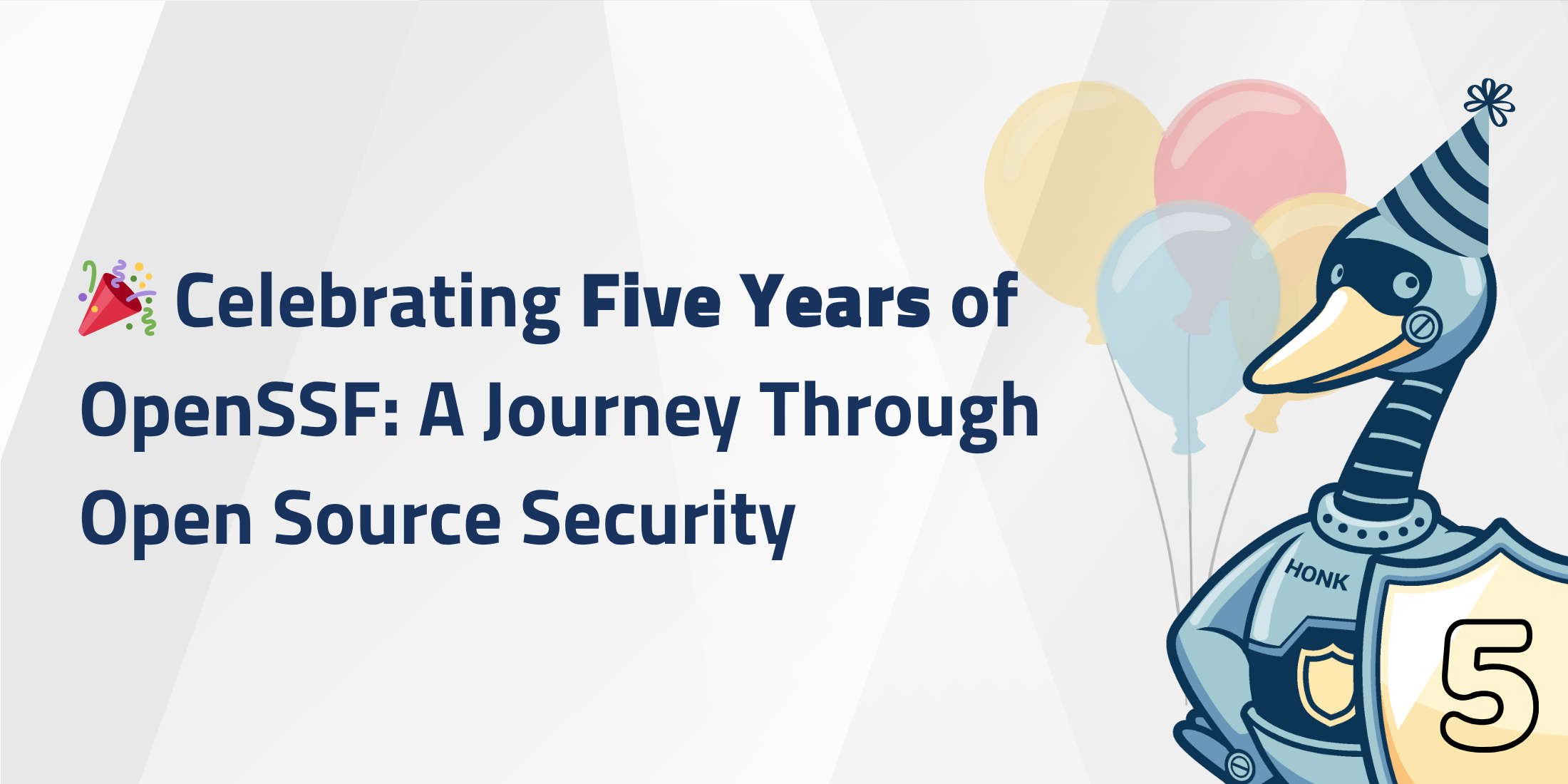
August 2025 marks five years since the official formation of the Open Source Security Foundation (OpenSSF). Born out of a critical need to secure the software supply chains and open source ecosystems powering global technology infrastructure, OpenSSF quickly emerged as a community-driven leader in open source security.
“OpenSSF was founded to unify and strengthen global efforts around securing open source software. In five years, we’ve built a collaborative foundation that reaches across industries, governments, and ecosystems. Together, we’re building a world where open source is not only powerful—but trusted.” — Steve Fernandez, General Manager, OpenSSF
OpenSSF was launched on August 3, 2020, consolidating earlier initiatives into a unified, cross-industry effort to protect open source projects. The urgency was clear—high-profile vulnerabilities such as Heartbleed served as stark reminders that collective action was essential to safeguard the digital infrastructure everyone depends on.
“From day one, OpenSSF has been about action—empowering the community to build and adopt real-world security solutions. Five years in, we’ve moved from ideas to impact. The work isn’t done, but the momentum is real, and the future is wide open.” — Christopher “CRob” Robinson, Chief Architect, OpenSSF
Over the past five years, OpenSSF has spearheaded critical initiatives that shaped the landscape of open source security:
2021 – Secure Software Development Fundamentals:
Launching free educational courses on edX, OpenSSF equipped developers globally with foundational security practices.
“When we launched our first free training course in secure software development, we had one goal: make security knowledge available to every software developer. Today, that same mission powers all of OpenSSF—equipping developers, maintainers, and communities with the tools they need to make open source software more secure for everyone.” — David A. Wheeler, Director, Open Source Supply Chain Security, Linux Foundation
2021 – Sigstore: Open Source Signing for Everyone:
Sigstore was launched to make cryptographic signing accessible to all open source developers, providing a free and automated way to verify the integrity and provenance of software artifacts and metadata.
“Being part of the OpenSSF has been crucial for the Sigstore project. It has allowed us to not only foster community growth, neutral governance, and engagement with the broader OSS ecosystem, but also given us the ability to coordinate with a myriad of in-house initiatives — like the securing software repos working group — to further our mission of software signing for everybody. As Sigstore continues to grow and become a core technology for software supply chain security, we believe that the OpenSSF is a great place to provide a stable, reliable, and mature service for the public benefit.”
— Santiago Torres-Arias, Assistant Professor at Purdue University and Sigstore TSC Chair Member
2021-2022 – Security with OpenSSF Scorecard & Criticality Score:
Innovative tools were introduced to automate and simplify assessing open source project security risks.
“The OpenSSF has been instrumental in transforming how the industry approaches open source security, particularly through initiatives like the Security Scorecard and Sigstore, which have improved software supply chain security for millions of developers. As we look ahead, AWS is committed to supporting OpenSSF’s mission of making open source software more secure by default, and we’re excited to help developers all over the world drive security innovation in their applications.” — Mark Ryland, Director, Amazon Security at AWS
2022 – Launch of Alpha-Omega:
Alpha-Omega (AO), an associated project of the OpenSSF launched in February 2022, is funded by Microsoft, Google, Amazon, and Citi. Its mission is to enhance the security of critical open source software by enabling sustainable improvements and ensuring vulnerabilities are identified and resolved quickly. Since its inception, the Alpha-Omega Fund has invested $14 million in open source security, supporting a range of projects including LLVM, Java, PHP, Jenkins, Airflow, OpenSSL, AI libraries, Homebrew, FreeBSD, Node.js, jQuery, RubyGems, and the Linux Kernel. It has also provided funding to key foundations and ecosystems such as the Apache Software Foundation (ASF), Eclipse Foundation, OpenJS Foundation, Python Foundation, and Rust Foundation.
2023 – SLSA v1.0 (Supply-chain Levels for Software Artifacts):
Setting clear and actionable standards for build integrity and provenance, SLSA was a turning point for software supply chain security and became essential in reducing vulnerabilities.
At the same time, community-driven tools like GUAC (Graph for Understanding Artifact Composition) built on SLSA’s principles, unlocking deep visibility into software metadata, making it more usable, actionable and connecting the dots across provenance, SBOMs and in-toto security attestations.
“Projects like GUAC demonstrate how open source innovation can make software security both scalable and practical. Kusari is proud to have played a role in these milestones, helping to strengthen the resiliency of the open source software ecosystem.”
— Michael Lieberman, CTO and Co-founder at Kusari and Governing Board member
2024 – Principles for Package Repository Security:
Offering a voluntary, community-driven security maturity model to strengthen the resilience of software ecosystems.
“Developers around the world rely daily on package repositories for secure distribution of open source software. It’s critical that we listen to the maintainers of these systems and provide support in a way that works for them. We were happy to work with these maintainers to develop the Principles for Package Repository Security, to help them put together security roadmaps and provide a reference in funding requests.” — Zach Steindler, co-chair of Securing Software Repositories Working Group, Principal Engineer, GitHub
2025
OSPS Baseline:
This initiative brought tiered security requirements into the AI space, quickly adopted by groundbreaking projects such as GUAC, OpenTelemetry, and bomctl.
“The Open Source Project Security Baseline was born from real use cases, with projects needing robust standardized guidance around how to best secure their development processes. OpenSSF has not only been the best topical location for contributors from around the world to gather — the foundation has gone above and beyond by providing project support to extend the content, promote the concept, and elevate Baseline from a simple control catalog into a robust community and ecosystem.” — Eddie Knight, OSPO Lead, Sonatype
AI/ML Security Working Group:
The MLSecOps White Paper from the AI/ML Security Working Group marks a major step in securing machine learning pipelines and guiding the future of trustworthy AI.
“The AI/ML working group tackles problems at the confluence of security and AI. While the AI world is moving at a breakneck pace, the security problems that we are tackling in the traditional software world are also relevant. Given that AI can increase the impact of a security vulnerability, we need to handle them with determination. The working group has worked on securing LLM generating code, model signing and a new white paper for MLSecOps, among many other interesting things.” — Mihai Maruseac, co-chair of AI/ML Security Working Group, Staff Software Engineer, Google
OpenSSF’s role rapidly expanded beyond tooling, becoming influential in global policy dialogues, including advising the White House on software security and contributing to critical policy conversations such as the EU’s Cyber Resilience Act (CRA).
OpenSSF also continues to invest in community-building and education initiatives. This year, the Foundation launched its inaugural Summer Mentorship Program, welcoming its first cohort of mentees working directly with technical project leads to gain hands-on experience in open source security.
The Foundation also supported the publication of the Compiler Options Hardening Guide for C and C++, originally contributed by Ericsson, to help developers and toolchains apply secure-by-default compilation practices—especially critical in memory-unsafe languages.
In addition, OpenSSF has contributed to improving vulnerability disclosure practices across the ecosystem, offering guidance and tools that support maintainers in navigating CVEs, responsible disclosure, and downstream communication.
“The OpenSSF is uniquely positioned to advise on considerations, technical elements, and community impact public policy decisions have not only on open source, but also on the complex reality of implementing cybersecurity to a diverse and global technical sector. In the past 5 years, OpenSSF has been building a community of well-informed open source security experts that can advise regulations but also challenge and adapt security frameworks, law, and regulation to support open source projects in raising their security posture through transparency and open collaboration; hallmarks of open source culture.” — Emily Fox, Portfolio Security Architect, Red Hat
Key community members, from long-standing contributors to new voices, have shaped OpenSSF’s journey:
OG Voices:
“Microsoft joined OpenSSF as a founding member, committed to advancing secure open source development. Over the past five years, OpenSSF has driven industry collaboration on security through initiatives like Alpha-Omega, SLSA, Scorecard, Secure Software Development training, and global policy efforts such as the Cyber Resilience Act. Together, we’ve improved memory safety, supply chain integrity, and secure-by-design practices, demonstrating that collaboration is key to security. We look forward to many more security advancements as we continue our partnership.” — Mark Russinovich, CTO, Deputy CISO, and Technical Fellow, Microsoft Azure
OpenSSF Leadership Perspective:
“OpenSSF’s strength comes from the people behind it—builders, advocates, and champions from around the world working toward a safer open source future. This milestone isn’t just a celebration of what we’ve accomplished, but of the community we’ve built together.” — Adrianne Marcum, Chief of Staff, OpenSSF
Community Perspectives:
“After 5 years of hard work, the OpenSSF stands as a global force for securing the critical open-source that we all use. Here’s to five years of uniting communities, hardening the software supply chain, and driving a safer digital future.” Tracy Ragan, CEO, DeployHub
“I found OpenSSF through my own curiosity, not by invitation, and I stayed because of the warmth, support, and shared mission I discovered. From contributing to the BEAR Working Group to receiving real backing for opportunities, the community consistently shows up for its members. It’s more than a project; it’s a space where people are supported, valued, and empowered to grow.” Ijeoma Onwuka, Independent Contributor
As we celebrate our fifth anniversary, OpenSSF is preparing for a future increasingly influenced by AI-driven tools and global collaboration. Community members across the globe envision greater adoption of secure AI practices, expanded policy influence, and deeper, inclusive international partnerships.
“As we celebrate OpenSSF’s 5th Anniversary, I’m energized by how our vision has grown into a thriving global movement of developers, maintainers, security researchers, and organizations all united by our shared mission. Looking ahead we’re hoping to cultivate our community’s knowledge and empower growth through stronger collaboration and more inclusive pathways for contributors.” – Stacey Potter, Community Manager, OpenSSF
We invite you to share your memories, contribute your voice, and become part of the next chapter in securing open source software.
Here’s to many more years ahead! 🎉
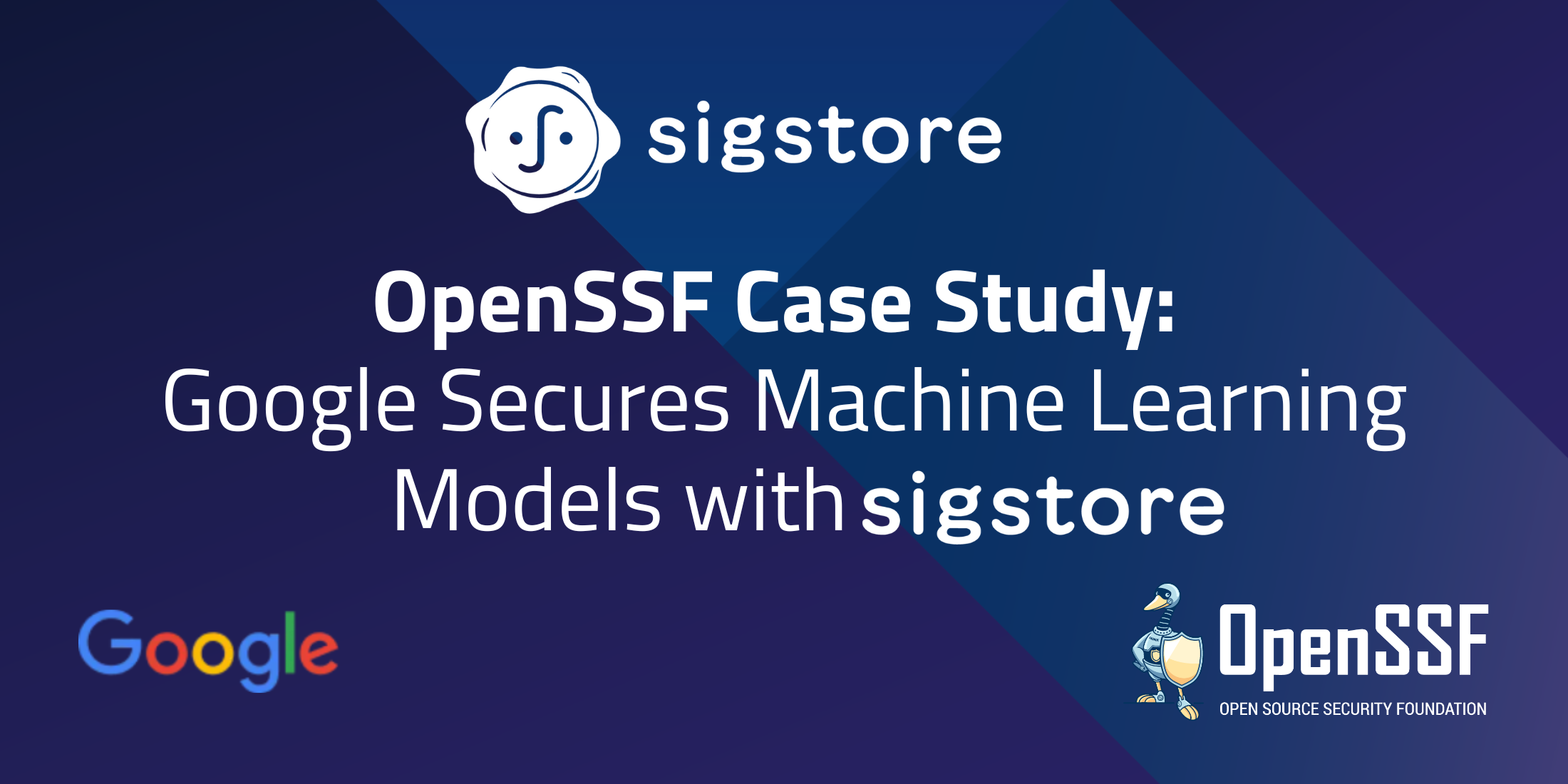
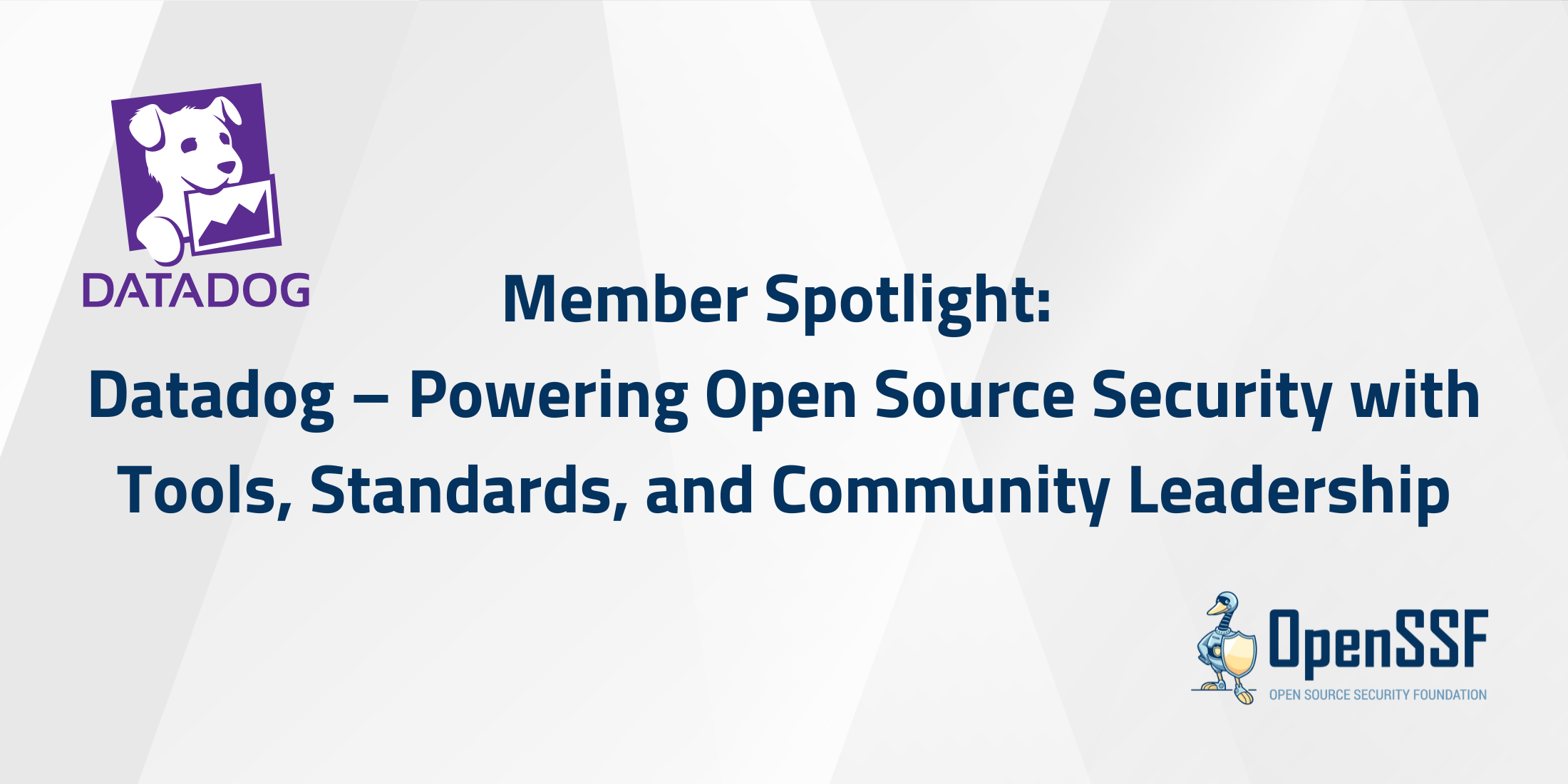
Datadog, a leading cloud-scale observability and security platform, joined the Open Source Security Foundation (OpenSSF) as a Premier Member in July, 2024. With both executive leadership and deep technical involvement, Datadog has rapidly become a force in advancing secure open source practices across the industry.
GuardDog: Open Source Threat Detection
In early 2025, Datadog launched GuardDog, a Python-based open source tool that scans package ecosystems like npm, PyPI, and Go for signs of malicious behavior. GuardDog is backed by a publicly available threat dataset, giving developers and organizations real-time visibility into emerging supply chain risks.
This contribution directly supports OpenSSF’s mission to provide practical tools that harden open source ecosystems against common attack vectors—while promoting transparency and shared defense.
Datadog actively supports the open source security ecosystem through its engineering efforts, tooling contributions, and participation in the OpenSSF community:
These collaborations demonstrate Datadog’s investment in long-term, community-driven approaches to open source security.
Datadog takes the stage at OpenSSF Community Day North America on Thursday, June 26, 2025, in Denver, CO, co-located with Open Source Summit North America.
They’ll be presenting alongside Intel Labs in the session:
Talk Title: Harnessing In-toto Attestations for Security and Compliance With Next-gen Policies
Time: 3:10–3:30 PM MDT
Location: Bluebird Ballroom 3A
Speakers:
This session dives into the evolution of the in-toto Attestation Framework, spotlighting new policy standards that make it easier for consumers and auditors to derive meaningful insights from authenticated metadata—such as SBOMs and SLSA Build Provenance. Attendees will see how the latest policy framework bridges gaps in compatibility and usability with a flexible, real-world-ready approach to securing complex software supply chains.
Register now and connect with Datadog, Intel Labs, and fellow open source security leaders in Denver.
By contributing to secure development frameworks, creating open source tooling, and educating the broader community, Datadog exemplifies what it means to be an OpenSSF Premier Member. Their work is hands-on, standards-driven, and deeply collaborative—helping make open source safer for everyone.
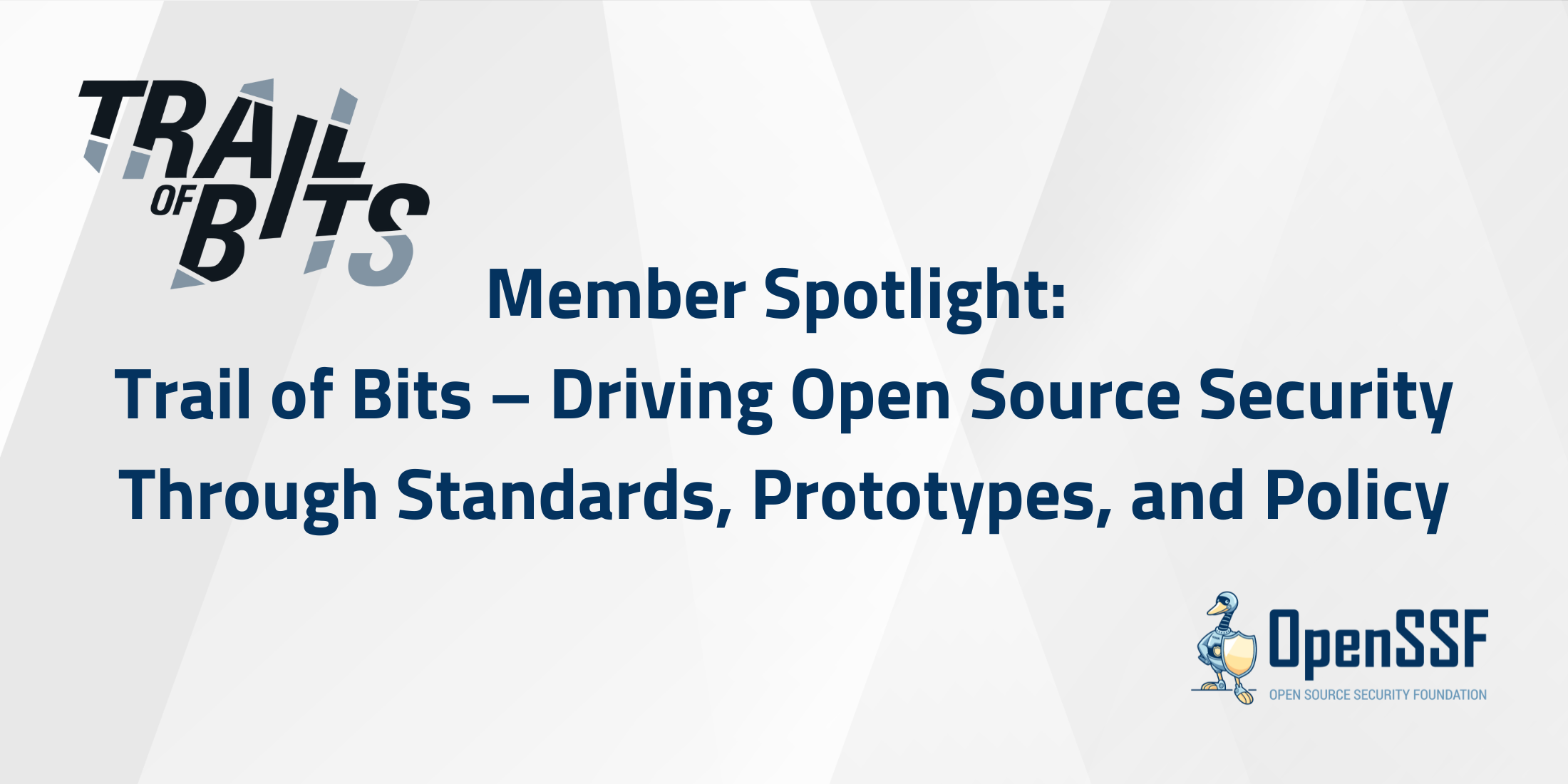
Trail of Bits is a leading cybersecurity research, engineering, and consulting firm that works with some of the most security-conscious organizations in the world—including Facebook, government agencies like DARPA, and prominent cryptocurrency protocols. Founded in 2012, each part of the company focused on open sourcing their work- tools,research, and audits wherever possible. Trail of Bits also maintains a dedicated research division focused on advancing industry-wide security practices, with specialized teams focused on securing open source infrastructure that both their clients and the broader technology ecosystem depend upon.
Trail of Bits’ work spans both policy and practice, often bridging emerging security needs with real-world implementation. Here are a few of the ways they’ve made an impact:
As open source continues to serve as the backbone of digital infrastructure, organizations like Trail of Bits play a vital role in making it more secure, reliable, and transparent. Their ability to influence both upstream policy (like PEPs) and downstream implementation (like OpenSSF Scorecard and Sigstore) helps move the entire ecosystem forward.
Trail of Bits remains actively engaged in exploring new opportunities for impact—whether that’s contributing technical guidance, launching prototypes, or leading standards discussions. Their work reflects the spirit of OpenSSF collaboration: practical, community-oriented, and always evolving.
Visit trailofbits.com to explore their research and tooling.
To get involved in OpenSSF projects or working groups, visit openssf.org.
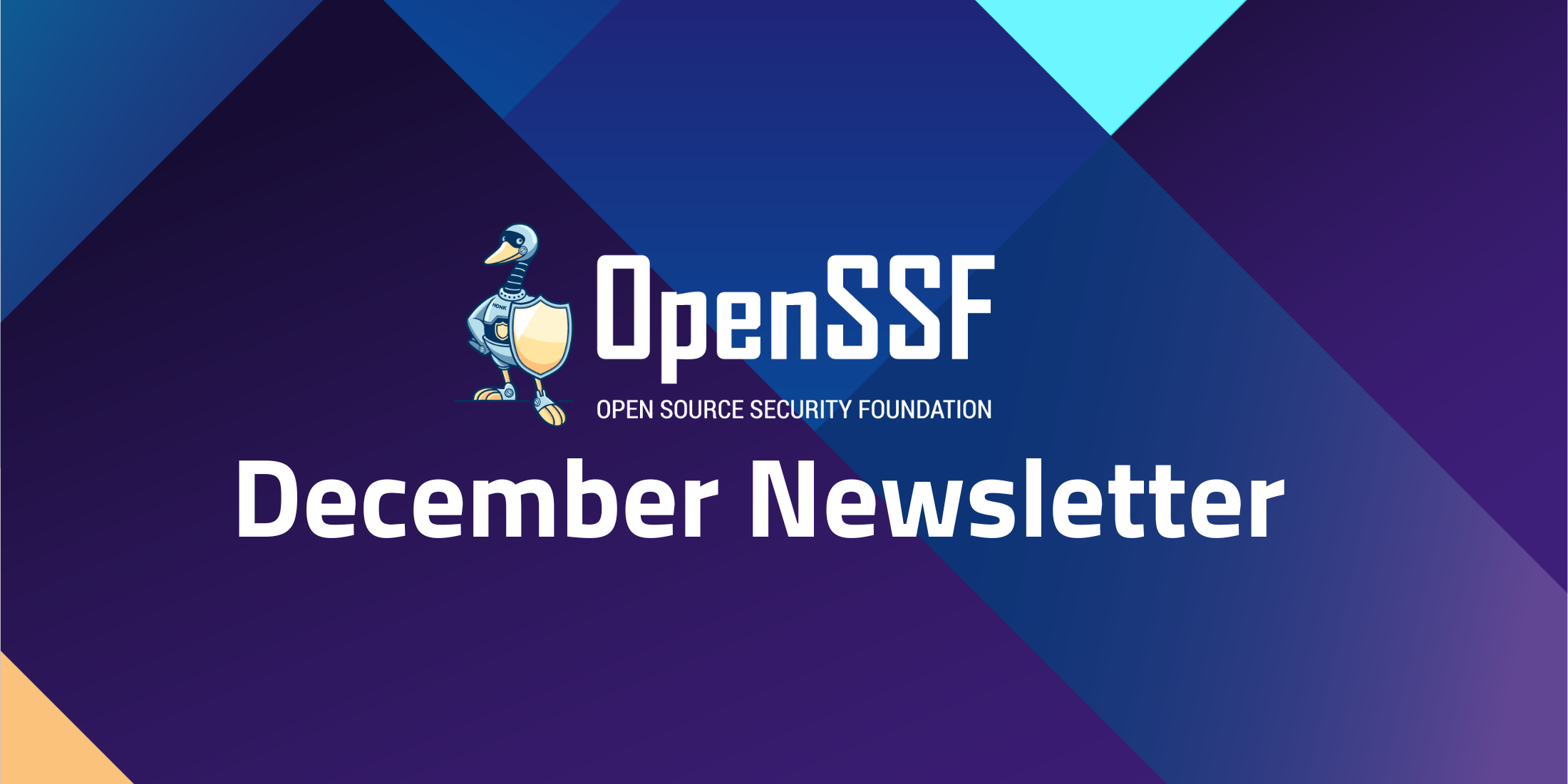
Welcome to the December 2024 edition of the OpenSSF Newsletter! Here’s a roundup of the latest developments, key events, and upcoming opportunities in the Open Source Security community.
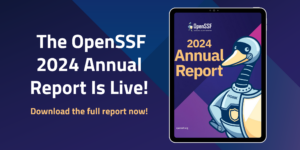
As 2024 comes to a close, we want to take a moment to express our deepest gratitude for the dedication, collaboration, and innovation you have brought to the OpenSSF community this year. Together, we achieved remarkable milestones—from expanding our global membership and launching impactful education initiatives to advancing critical security projects and fostering collaborations with public and private sectors. Your contributions have strengthened our shared mission to secure the open source ecosystem and build a safer, more reliable digital future.
As we look forward to 2025, we’re excited to continue fostering a vibrant and inclusive community, deepening collaborations, and driving meaningful change together. We appreciate your role in this journey.
Wishing you a safe and joyful holiday season!
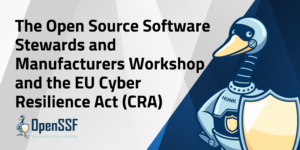
In December, the Linux Foundation Europe and the OpenSSF hosted the Open Source Software Stewards and Manufacturers Workshop in Amsterdam, focusing on the implications of the EU Cyber Resilience Act (CRA). The event brought together industry leaders, community experts, and government officials to align on CRA obligations and foster collaboration for compliance.
Key outcomes included the formation of the Global Cyber Policy Working Group and three workstreams: CRA Readiness & Awareness, CRA Tooling & Processes, and CRA Standardization.
Details on how to participate and learn more:
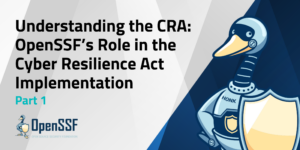
Published as Regulation (EU) 2024/2847 in the Official Journal of the European Union, the Cyber Resilience Act (CRA) entered into force (EIF) on December 10, 2024. The CRA will fully apply three years later, on December 11, 2027. The CRA will obligate all products with digital elements, including their remote data processing, put on the European market to follow this regulation. This new blog series will cover the implementation of the CRA and its relevance to open source software.
In Part 1, we will provide a general overview of the CRA and highlight LF Europe and the OpenSSF’s current activities in relation to the implementation.
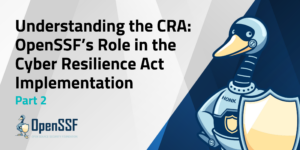
In Part 1, we provided a general overview of the CRA and highlighted OpenSSF’s current activities related to its implementation. In Part 2, we’ll take a closer look at the three-year implementation timeline and what lies ahead.

The Shaping the Future of Generative AI report, sponsored by LF AI & Data and CNCF, highlights how organizations prioritize security, cost, and performance as they adopt GenAI. Security remains a top concern, particularly in sectors like finance and healthcare, where privacy and regulatory compliance are critical.
The Open Source Security Foundation (OpenSSF) AI/ML Working Group plays a vital role in this landscape, focusing on initiatives like model signing with Sigstore to enhance trust and security in AI systems. This blog ties together insights from the report and OpenSSF’s ongoing efforts to address security challenges in GenAI adoption.
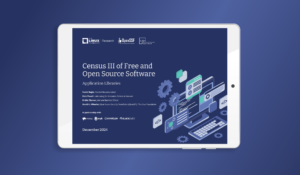
The Linux Foundation and Harvard released Census III, a groundbreaking study analyzing Free and Open Source Software (FOSS) usage and security challenges. Findings reveal trends like the rise of cloud-specific packages, increased reliance on Rust, and the critical role of a small group of contributors.

At the inaugural SOSS Community Day India, OpenSSF welcomed Honda and Guidewire Software as new members, expanding its growing global network to 126 organizations. The event highlights India’s thriving open source ecosystem and brings together leaders to collaborate on securing the software we all depend on.
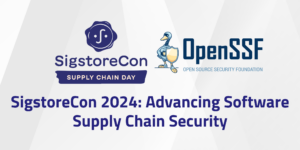
On November 12, 2024, the software security community gathered in Salt Lake City for SigstoreCon: Supply Chain Day, co-located with KubeCon North America 2024. The one-day conference brought together developers, maintainers, and security experts to explore how Sigstore is transforming software supply chain security through simplified signing and verification of digital artifacts.
You’re invited to…
We want to get you the information you most want to see in your inbox. Have ideas or suggestions for next month’s newsletter about the OpenSSF? Let us know at marketing@openssf.org, and see you in 2025!
Regards,
The OpenSSF Team
